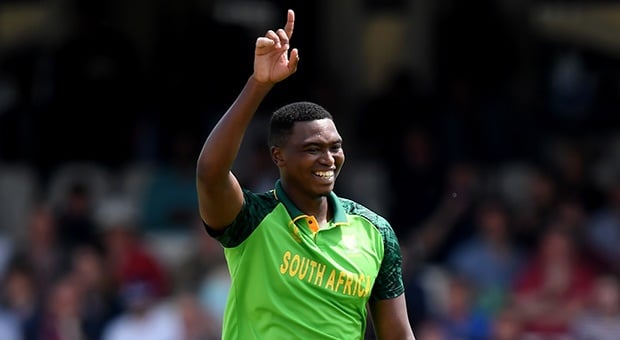


Proteas fast bowler Lungi Ngidi
Former national cricketers Pat Symcox and Boeta Dippenaar need to get to grips with the history of their game, their country and the society they live in. Their attacks on magnificent fast bowler Lungi Ngidi are testimony to an inability to recognise the moment and a failure to understand the issues at hand, writes Pieter du Toit.
Few sports are more political than cricket.
It is a game that, more than any other, is built on historical race and class divides, being the pastime of choice for English aristocrats and royals since, at least, the early 18th century.
When the game was established in the form that we know it today, it remained one which – like rugby – reflected the class structure of British society with a strict divide between “gentlemen” and “professionals”, between those who played it because of the sport’s nobility and those who played it to earn a living.
READ | Former Proteas Dippenaar, Symcox criticised after laying into Ngidi over Black Lives Matter stance
And when the British Empire was at its zenith, with the sun never setting on the Union Jack across the globe, cricket was used to spread the gospel of English civilisation, taking root in Britain’s most important overseas possessions: New Zealand, Australia, India, South Africa and the West Indies, but always according to the dictates of the mother country.
The sport was never mass based, like soccer, which became the game of the working man and the favourite in every corner of the world. Cricket was elitist, run from London by imperialists meeting at the Victorian headquarters of the Marylebone Cricket Club at Lord’s, in the suburb of St John’s Wood. Indeed, the world governing body was, for decades, known as the Imperial Cricket Conference, deciding the rules that governed the game and directing the development of the sport.
In South Africa, cricket took the route of every other major sport: delineated along racial lines, with the white game delivering the country’s official representatives and black and coloured players relegated to the fringes of society.
Cricket, and sport, have always been political. Cricket represents class divides, privilege and resistance. It was a vehicle to challenge the system and status quo, and became a site of struggle for those who wanted to break the system of racial segregation and apartheid.
But beyond South Africa’s shores, the game has always been beset by race issues. Indeed, for years, the captain of the West Indies had, by convention, been white. And when Clive Lloyd’s team started its protracted period of world dominance, thanks to its fearsome battery of black fast bowlers, the suits at Lord’s wanted to change the rules to blunt the fear and destruction wrought by Michael Holding and co.
Former national cricketers Pat Symcox and Boeta Dippenaar need to get to grips with the history of their game, their country and the society they live in. Their attacks on magnificent fast bowler Lungi Ngidi – rejecting his statement that he would want the Proteas to consider showing support for the Black Lives Matter movement – are testimony to an inability to recognise the moment and a failure to understand the issues at hand.
Dippenaar, in particular, sounded like he simply ingested what the New Right regurgitate on Twitter or their announcement of a new fear-mongering hashtag campaign, while they unthinkingly parrot their Fox News heroes.
The former national batsman said: “I am afraid to say ‘Black Lives Matter’ have become nothing more than leftist political movement. I would suggest that Lungi Ngidi listens a bit more to likes of Thomas Sowell, Larry Elder, Walter Williams and Milton Friedman (sic).”
“All lives matter. If you want me to stand shoulder to shoulder with you, Lungi, then stand shoulder to shoulder with me with regards to farm attacks.”
Symcox, who enjoys a braai and singalong with Steve Hofmeyr, added: “What nonsense is this. He must take his own stand if he wishes. Stop trying to get Proteas involved in his belief.”
READ | Boeta Dippenaar stands by views on Black Lives Matter: ‘All lives matter’
They would do well to listen to Holding’s plea on Sky Sports earlier this week, during the first test between England and the West Indies, when he spoke about institutional racism in sport and society and explained how the decks were stacked against black people in even the most mundane of settings.
Educating people about racism is the key, he said. “When I say education, I mean going back in history. What people need to understand is that thing stems from a long time ago, hundreds of years ago.
“The dehumanisation of the black race is where it started. People will tell you ‘that’s a long time ago, get over it’. No, you don’t get over things like that and society has not gotten over something like that.”
Black Lives Matter is not about saying those lives are more important than any other lives – it is saying that black lives, after all this time, are as important as others. And more than being taken literally, it is about creating awareness about deeply entrenched, institutional and historical prejudices against black people and that it cannot go on.
It is about recognising the moment and acknowledging that society has reached a point where change must come.
Cricket is political. Playing for the national team comes with enormous responsibilities as well as real leverage to change society for the better. Ngidi has recognised the moment. Dippenaar and Symcox have not.

